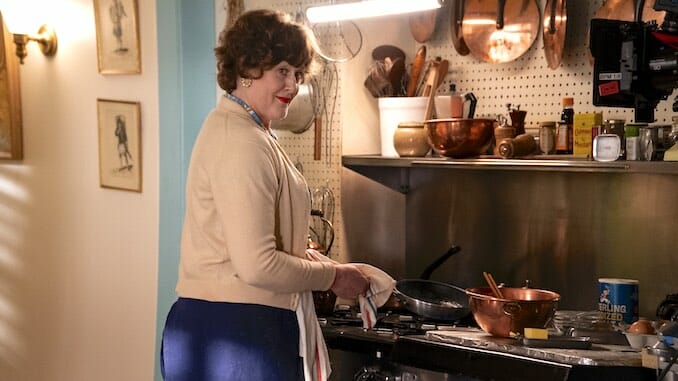HBO Max’s Julia Is a Delicious Treat
Photos Courtesy of HBO Max
Every night when my family and I sit down to dinner, the last thing I say before we start to eat is “Bon appétit!” But it wasn’t until I watched HBO Max’s new series Julia that I realized Julia Child is the reason. Child ended every episode of her pioneering PBS series The French Chef with that French phrase encouraging her viewers to enjoy their meal. I wasn’t even born when the series premiered in 1962, but Child’s influence on the pop-culture landscape is so vast that every night I pay homage to her without ever fully appreciating it.
Today we have entire networks devoted to cooking, and it’s hard to fully comprehend how groundbreaking it was at the time to show a chef making a meal on TV. The eight episode series tells the origin story of Julia Child’s rise to fame as one of television’s first celebrity chefs. But just as Child (as so deftly played by Sarah Lancashire) was much more than just a chef, the series is much more than just about her. It’s about her marriage, rooted in devotion, love and equality. And it’s about a very specific moment in time when fewer women worked and even fewer had positions of power. Frozen TV dinners, tuna casseroles and, as one character puts it, cooking that made him “sad and fearful” were more the norm. TV was in its nascent stages, with Child and her husband Paul (David Hyde Pierce) not even owning one when she first got the idea for her series.
Fresh off the success of her cookbook Mastering the Art of French Cooking, Child and Paul returned to the United States from Paul’s diplomatic assignment in Oslo and settled in Cambridge, Massachusetts. The local PBS station, WGBH, was bogged down with highbrow programming like I’ve Been Reading, hosted by Albert Duhamel (a hilariously stuffy Jefferson Mays), and Julia’s first TV appearance on Duhamel’s show sparked both an interest in her and in the audience to see more cooking on TV. Child made cooking approachable; her bubbling, effervescent personality came alive on the small screen. Viewers felt as though she were cooking just for them.
The resistance to the idea is nearly overwhelming, though, as WGBH Director Russ Morash (Fran Kranz) has dreams of Broadway and feels that a cooking show is beneath him. When first presented with the idea, he proclaims that, “This is public television for God sake!” All the WGBH male executives treat Julia as something of a joke. Tall, plump, and not considered conventionally attractive at the time, Child was written off as having “looks for radio,” with even her own father (James Cromwell) thinking Paul married her for her money.
The sentiment running rampant when Julia began The French Chef was that TV was a passing fancy and not something to be taken seriously. “TV is not the future,” Blanche Knopf (Judith Light), Julia’s publisher, scoffs. “Books are our legacy.” The series is billed as a comedy and there are definitely funny moments—notably when people are literally on the floor assisting Julia in the filming of her show—but Julia explores not just how pioneering Child was in showing cooking on TV, but how pioneering she was for television production in general.
Ultimately, the series hinges on Lancashire’s transformative performance. She inhabits Child so fully from her very specific accent, to the cadence of her speech to the absolute infectious joie de vivre in her interactions with others. Lancashire is never impersonating Child, she is fully inhabiting her. Child’s enthusiasm for everything was pervasive; she enjoyed food savoring the flavors and textures, and she wasn’t, as the saying goes, afraid to take up space in the room. Lancashire also shines in Child’s more vulnerable moments when she doubts herself, whether it’s because a famous chef has dismissively told her to “leave the cooking to the men,” or a former classmate makes a surprising admission, or when she wonders how she will charm someone who doesn’t find her “the least bit charming.”
One of the series’ pure joys is the on-screen reunion of Pierce with Bebe Neuwirth, who plays Julia’s best friend Avis DeVoto. Paul and Avis have a good-natured but adversarial relationship, with Avis telling him, “The truth is Paul, it would be so much easier if you were dead.” For fans of Cheers and Frasier, having this iconic duo and their fun rat-a-tat rapport back on the small screen again is a sheer delight.
-

-

-

-

-

-

-

-

-

-

-

-

-

-

-

-

-

-

-

-

-

-

-

-

-

-

-

-

-

-

-

-

-

-

-

-

-

-

-

-








































